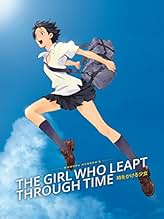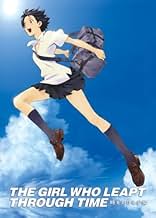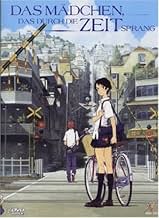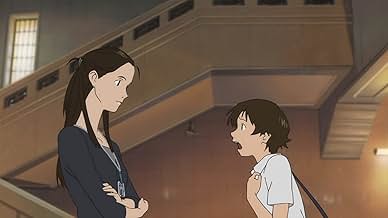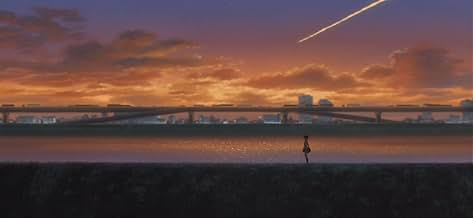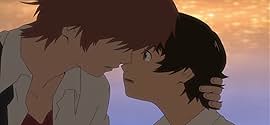VALUTAZIONE IMDb
7,6/10
74.111
LA TUA VALUTAZIONE
Una ragazza del liceo acquisisce il potere di viaggiare indietro nel tempo e decide di usarlo a suo vantaggio. Ma la sua decisione sta influenzando la vita degli altri e di se stessa.Una ragazza del liceo acquisisce il potere di viaggiare indietro nel tempo e decide di usarlo a suo vantaggio. Ma la sua decisione sta influenzando la vita degli altri e di se stessa.Una ragazza del liceo acquisisce il potere di viaggiare indietro nel tempo e decide di usarlo a suo vantaggio. Ma la sua decisione sta influenzando la vita degli altri e di se stessa.
- Regia
- Sceneggiatura
- Star
- Premi
- 12 vittorie e 2 candidature totali
Riisa Naka
- Makoto Konno
- (voce)
Yuki Sekido
- Miyuki Konno
- (voce)
Keiko Yamamoto
- Obasan
- (voce)
Takayuki Handa
- Kato
- (voce)
Keiko Aizawa
- School Nurse
- (voce)
- …
Recensioni in evidenza
This terrific fantasy focuses on a girl who discovers she can jump back in time, and much of the movie is a light-hearted exploration of what a teenage girl would do with that power, which is essentially relive life better, avoid uncomfortable conversations, and eat pudding. The lead character is likably average.
There are a few oddities in this movie. Some of them are because it turns out, as I learned at wikipedia, that this isn't actually the same story as the novel upon which it is based but a sequel containing a character from the original movie, which explains a lot. Apparently the original story has been made into several movies and TV series in Japan, so the assumption was probably that everyone would understand a lot of references I didn't get.
Also, towards the end, we are given little pieces of information that suggest there is a whole other story to learn, although whether that story is in the original book or whether that would be the subject of yet another narrative I don't know.
Then there's the ending, which is logically unsatisfying and yet which I ultimately found emotionally resonant. It's one of these puzzling endings that has you reading wikipedia and going through the IMDb forum posts (which offer a lot of fascinating theories).
Well worth watching.
There are a few oddities in this movie. Some of them are because it turns out, as I learned at wikipedia, that this isn't actually the same story as the novel upon which it is based but a sequel containing a character from the original movie, which explains a lot. Apparently the original story has been made into several movies and TV series in Japan, so the assumption was probably that everyone would understand a lot of references I didn't get.
Also, towards the end, we are given little pieces of information that suggest there is a whole other story to learn, although whether that story is in the original book or whether that would be the subject of yet another narrative I don't know.
Then there's the ending, which is logically unsatisfying and yet which I ultimately found emotionally resonant. It's one of these puzzling endings that has you reading wikipedia and going through the IMDb forum posts (which offer a lot of fascinating theories).
Well worth watching.
"I wonder how someone was able to create such a beautiful painting, when it must have seemed that the world was coming to an end."
When high school student Makoto inadvertently discovers that she's gained the ability to leap (literally) backward through time, she immediately begins using it to her advantage - with little concern for how and why she's gained this mysterious power. No problem is too trivial to be solved by a little time travel, from pop quizzes to uncomfortable conversations. But, nothing in the past can be changed without consequence, and Makoto's frivolous use of her ability may result in one or more of her friends being lost forever.
The Girl Who Leapt Through Time is about as mainstream and accessible as anime gets. The characters are all pretty normal, likable, and relatable. There's a lot of humor in the first half of the story, while the last half is quite serious, heartfelt, and poignant. The animation and character designs are clean and smooth, and have a very modern appeal. The score has a lot of piano pieces that occasionally caught my ear in a very pleasant way.
I recommend this both to anime fans, and to those who aren't particularly familiar with eastern animation. The story is an entertaining mix of moments both somber and lighthearted, the characters are great, and the visuals were top-notch. The Girl Who Leapt Through Time isn't just a good animated movie, it's good by any standards.
When high school student Makoto inadvertently discovers that she's gained the ability to leap (literally) backward through time, she immediately begins using it to her advantage - with little concern for how and why she's gained this mysterious power. No problem is too trivial to be solved by a little time travel, from pop quizzes to uncomfortable conversations. But, nothing in the past can be changed without consequence, and Makoto's frivolous use of her ability may result in one or more of her friends being lost forever.
The Girl Who Leapt Through Time is about as mainstream and accessible as anime gets. The characters are all pretty normal, likable, and relatable. There's a lot of humor in the first half of the story, while the last half is quite serious, heartfelt, and poignant. The animation and character designs are clean and smooth, and have a very modern appeal. The score has a lot of piano pieces that occasionally caught my ear in a very pleasant way.
I recommend this both to anime fans, and to those who aren't particularly familiar with eastern animation. The story is an entertaining mix of moments both somber and lighthearted, the characters are great, and the visuals were top-notch. The Girl Who Leapt Through Time isn't just a good animated movie, it's good by any standards.
Having watched the trailers on the net for Toki wo Kakeru Shoujo (official English title: The Girl Who Leapt Through Time), I've been looking forward to it for a while. With character designs by Yoshiyuki Sadamoto, the same guy who did those for Neon Genesis Evangelion, and animation by Madhouse, Tokikake (as it is nicknamed in Japan), is a great-looking movie. Lively and interesting backgrounds, lush colours and detailed animation, it's a joy to look at. Particular mention must be made of the time-leaping effect, which gives you a sense of breathlessness. The voice acting is extremely enjoyable, with the voice actors really managing to convey their characters' personalities, while endearing them to the viewer. The music is great, with a wonderfully wistful theme song "Garnet", provided by Hanako Oku. The direction is interesting, with some really nice shots effectively conveying the more important events and scenes. Overall, I really enjoyed Toki wo Kakeru Shoujo, which is why it is such a mystery as to why it is only showing in one cinema house in all of Tokyo. With Gedo Senki generally failing to live up to people's expectations, were Tokikake shown in a few more cinemas, it could have the potential to be the surprise blockbuster of the summer. Definitely to be recommended over Gedo Senki as the anime movie of the summer.
10oncex
This film is one of those films that comes once in every generation. The voice actors give the characters a sense of realness that makes you suffer or feel joy. The detail of the work is phenomenal and the story doesn't drag or end in a familiar way. I specially like the detail they put to little things as the sliding doors bouncing back open when Makoto tries to close them. This is one of those films that in the end it leaves you a good feeling and not guilty for spending two hours enjoying yourself. When you see this film you might have to find time to think when was the last time you saw something so good.I just wish there's a sequel for it, because I just couldn't get enough of it. But maybe is one of those stories that you wish it never ended but you know that it has to end.
P.S. Now I have to buy the DVD.
P.S. Now I have to buy the DVD.
Based on Yasutaka Tsutsui's 1967 novel, - which has been adapted several times over the years, including 1983's The Little Girl Who Conquered Time - The Girl Who Leapt Through Time is a charming mix of drama and romantic comedy, with a slight infusion of science fiction ideas. Makoto (Riisa Naka) is a high school girl who, through serendipity, gains the ability to leap back in time (but she only manages moments or hours back). She has platonic relationships with two high school boys, Chiaki (Takuya Ishida) and Kousuke (Mitsutaka Itakura), and they spend their time playing baseball.
With her new-found abilities, she does nothing spectacularly profound, and the films intentions aren't to comment on paradoxes or to shift the space-time continuum as is usually the case with time travel narratives. Makoto uses her abilities to repeat events that pleasure her, to ace a school test, and also to avoid certain embarrassing situations with her friends. But as her relationships with, particularly, Chiaki and Kousuke, her leaps become more personally profound, as she attempts to possibly save the people she cares for (within the context of small human moments of danger, and not the usual global/country catastrophes.
I love the fact that in Japan, they do not distinguish between live- action cinema and animated (anime if you like) films, they are all simply movies. Now I'm going to contradict this with a Western perspective: This beautifully animated film is a delight to view, with its traditional two-dimensions, it is evidence to the west that 3D, computer generated animation is not the overbearing format, and 2D is still a genuinely viable medium. The film is filled with charming human moments, both touching and thoughtful. Teenage comedies rarely have this level of tenderness of character, that also explores concepts of fate, the passage of time and the intricacies of small human moments, and the delicate nature of human relationships.
www.the-wrath-of-blog.blogspot.com
With her new-found abilities, she does nothing spectacularly profound, and the films intentions aren't to comment on paradoxes or to shift the space-time continuum as is usually the case with time travel narratives. Makoto uses her abilities to repeat events that pleasure her, to ace a school test, and also to avoid certain embarrassing situations with her friends. But as her relationships with, particularly, Chiaki and Kousuke, her leaps become more personally profound, as she attempts to possibly save the people she cares for (within the context of small human moments of danger, and not the usual global/country catastrophes.
I love the fact that in Japan, they do not distinguish between live- action cinema and animated (anime if you like) films, they are all simply movies. Now I'm going to contradict this with a Western perspective: This beautifully animated film is a delight to view, with its traditional two-dimensions, it is evidence to the west that 3D, computer generated animation is not the overbearing format, and 2D is still a genuinely viable medium. The film is filled with charming human moments, both touching and thoughtful. Teenage comedies rarely have this level of tenderness of character, that also explores concepts of fate, the passage of time and the intricacies of small human moments, and the delicate nature of human relationships.
www.the-wrath-of-blog.blogspot.com
Lo sapevi?
- QuizThis movie is an indirect adaptation of Yasutaka Tsutsui's novel "The Girl Who Leapt Through Time" - the main character's aunt is Yoshiyama Kazuko, the protagonist of the novel.
- BlooperSpoiler: During the time-stop sequence Chiaki laments that he will not be able to see the painting he has come to the past for because it is in restoration and he will not be around the next day when it is put on the wall. But Makoto knows that the picture is worked on by her aunt and so they could just go upstairs and take a look at it (they may find the door locked but the possibility is not even mentioned). Chiaki's last jump could not have erased that memory because Makoto's knowledge predates the event.
- Citazioni
Yuri Hayakawa: [Makoto Leaves the room, then Yuri watches the Blackboard] Makoto: Time waits for no one
- ConnessioniFeatured in Glass Reflection: The Girl Who Leapt Through Time (2010)
I più visti
Accedi per valutare e creare un elenco di titoli salvati per ottenere consigli personalizzati
Dettagli
Botteghino
- Lordo in tutto il mondo
- 1.535.976 USD
- Tempo di esecuzione
- 1h 38min(98 min)
- Colore
- Mix di suoni
- Proporzioni
- 1.78 : 1
Contribuisci a questa pagina
Suggerisci una modifica o aggiungi i contenuti mancanti


